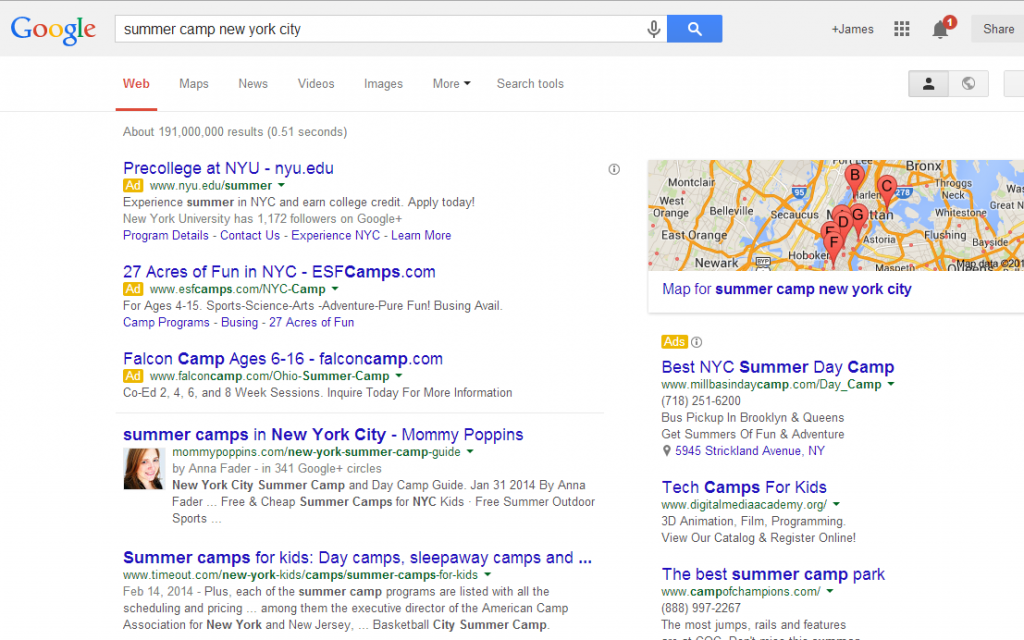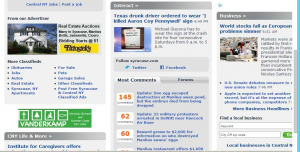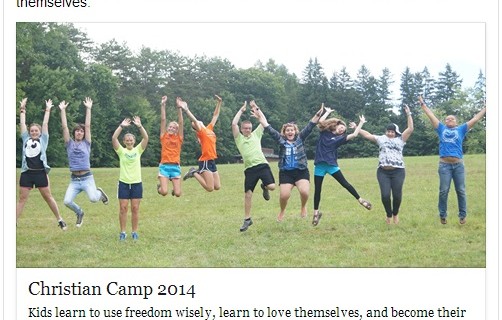Bring more kids to summer camp, but only if you don’t screw it up the way I have!
The world of online advertising is downright scary. Purchasing nebulous “clicks” and “views” was enough to give this traditional marketer fits when I first threw my hat into the ring of online advertising. While we had some nice successes along the way, we had some fairly epic failures as well. I’m here to share with you the good, the bad, and the ugly.
I’m going to break down the three ways we’ve attempted to pay for advertising online, and our various successes and failures with each. I’m here to take the mystery away from online paid advertising – this stuff really works if you know which choppy waters to avoid, and which low hanging fruit to pick. Luckily I’ve gotten chopped up quite a bit on my way to picking some delicious advertising fruit, and I’ll share the details of my experiences with you for free 🙂
The 3 ways we’ve paid for advertising online are Facebook advertisements, Google Adwords, and standard banner ads with a local newspaper’s website (syracuse dot com). If you want to skip ahead to either of those sections, go for it.
No?
Let’s start with some serious failures, then, shall we?
The keys to using Google Adwords effectively
Google Adwords are some of the most powerful forms of advertising to have ever been available to online marketers. They have also been some of the most dangerous money sinks known to online marketers. I’d describe my experience with them as the latter. If you are unfamiliar with Google Adwords advertisements, they are the terms that appear with the word “ad” next to them above what are known as “organic” search results – or the pages that rank highly because they are the ones people are actually looking for 🙂

I could go pretty geeky on you here, but I’ll spare you the novel, and give you brass tax.
Google Adwords are awesome for one reason – intent to buy. When people type a term into a search engine like “summer camps new york city,” there’s a great chance they intend to find a summer camp website to buy a session for their children. This gives them a huge advantage that simply doesn’t exist on the other platforms I’ve used. It’s been shown time and time again that for sales conversions, Google Adwords are king.
Since you can pay for clicks (i.e., you only pay if someone actually clicks your ad), you know that you are only paying a dime any time someone has actually come across your website. This is a terrific deal, and one I think anyone who has tried “print and pray” forms of print advertising would kill for.
A quick pro tip – if you do go the route of Google Adwords, make sure you link to a page where someone can actually make a purchase. People who click advertisements are notoriously fickle – if they can’t take action in any obvious way, they are quite likely to simply disappear on you.
It all sounds pretty amazing, right? You just pick some search terms that you think people would type in who’d want to go to your summer camp, and you go from there, right? Wrong.
I’ll explain.
The key to NOT failing Google Adwords like I did
I jumped on the opportunity for Google Adwords 2 years ago, and quickly found that they were an incredible money sink for our camp. What I didn’t understand at the time was that Google actively promotes certain ads, while hiding others. It all comes down to the % of the time that a search user clicks through your ad in comparison with other people’s ads.
In our case – a horrifying thing was happening. Our ad had disappeared from the terms we actually needed to rank for (summer camps in Syracuse) and been promoted to the top for a term we already ranked highly for (Christian Summer Camps Syracuse). Why was this such a disaster? Our advertisement was only being shown for a term we already ranked 1st place for!. We were paying for clicks we had already earned via our strong search presence! Terms that we were no where to be found for, like “summer camps in Syracuse,” didn’t show our ad at all.
This still happens all over the internet. Check out the advertisement below. Turbo Tax’s ad is listed right above Turbo Tax’s page for the search term “Turbo Tax.” They’re paying several dollars to drive people to their website who are already looking for it!

About $100 into our Google Adwords campaign, we pulled the plug. We had spent $100 to bring users to our website that would have found us anyway.
Does this mean Adwords can’t work for you? Absolutely not! A large reason our ads were failing to convert for the terms we needed was that people were legitimately looking for something else when they typed in “Summer camps syracuse.” They wanted a summer camp at Syracuse University. It’s just not a term we’ll ever compete for while the University is here.
Just one word to the wise – if you do use Adwords, make sure you check up to see where you’re ranking for the terms you actually want to move up in the rankings for. An easy way to do this is to use Google Chrome, and via an incognito window (go to the upper right corner of your window where the 3 lines are for “settings,” and select “open new incognito window”), search for the terms for the keywords you’re targeting. Incognito windows will not use your profile information (and thus won’t bring you to your own camp’s website, which it is very much aware that you are interested in finding), and will show you exactly where you rank for different terms to the average user. If your ad is appearing for the terms you want to compete – it’s full steam ahead. If it isn’t? Time to pull the plug.
Advertising on Local Websites
 If Google Adwords were our biggest failure, I’d have to say that advertising with a local newspaper’s website was a very close second. We paid $1,500 to run an advertisement for 1 month that appeared on the top banner of Syracuse.com, and frequently in sidebars throughout the website. An example of one such ad is to the left of this paragraph.
If Google Adwords were our biggest failure, I’d have to say that advertising with a local newspaper’s website was a very close second. We paid $1,500 to run an advertisement for 1 month that appeared on the top banner of Syracuse.com, and frequently in sidebars throughout the website. An example of one such ad is to the left of this paragraph.
If you squint, you can see the green Vanderkamp logo on the left side of the page.
This ad was a failure for the reason most banner advertisements are – they are going basically obsolete. Instead of paying per click, we paid one lump some for a certain amount of exposure on the site. Now, there’s no way to know FOR SURE that these ads failed. For all I know, some family who sent 3 kids to camp last summer heard about us through this advertisement first. But since they didn’t send us any click-through metrics, and our website only reported a handful of clicks that came from it, I’m stamping it a failure. Especially in comparison with my very best option so far – Facebook advertising.
Listen – there is still a place for advertisements like the one I placed with Syracuse.com. But the prices has to be right. For $1,500, I could easily get 1,000 clicks on Facebook. There’s just no way I’m converting nearly as many campers on Syracuse.com as I am through 1,000 people through a targeted Facebook advertisement. There just isn’t.
Our online holy grail, and many people’s public enemy #1 – FaceBook
You’ve probably been hearing a lot of buzz recently about how Facebook is burying the posts of pages you like to try and get them to pay to boost their posts. You’ve probably heard online marketers wringing their hands about this, and social media creators tearing their hair out in frustration.
You know who shouldn’t be mad? Summer camps.
You see, as summer camps, we have a pretty excellent business model. Our clients tend to be worth quite a bit to us financially (if you don’t believe me, check out our Summer Camp Retention Tool, which will tell you exactly what each camper of yours is worth to you in the long run) – and they often don’t cost very much to convert. For any advertisement to be successful, we have to convert relatively few summer campers to our roles each summer.
So this outrage over people’s free Facebook posts getting buried? Yeah, we don’t need to worry about that.
The simple fact of the matter is that Facebook is an incredible native content platform for advertisement if we use it correctly. The first rule #1 always applies – you must guide people to a sales page for Facebook ads to work best. But after that? They’re pretty tough to screw up. Let me walk you through how to make it happen.
Targeted ads – our most powerful marketing tool
I am so excited to share with you the excellence of Facebook Ads that I hardly know where to begin. But allow me to begin…someplace.
Easily the greatest thing about Facebook advertisements is that we can target them to the exact people we want to. With a very user-friendly interface, we can choose the exact zip codes that receive our advertisements (so people are more likely to be able to afford our sessions, for instance, or so we at least know the people who find us are close enough to get to camp), we can choose the exact type of person we want to target our ads toward (Mothers ages 35-50? Hello, decision makers!), and we can even target people of certain interests! You run a JCC Camp? A Christian Camp? An All-boys camp? No problem – Facebook lets you hit all the right parents. No more time worrying if people who actually want to buy camp are clicking on our ads. We can hone in on the exact people who will be interested in our summer camps – an advantage summer camps have never had until now.
Constructing the perfect ad
Now, I won’t say that my ads have reached “perfect” status, but they are darn effective. I’ve run dozens of ads via Facebook (you can test ads with the same copy and different pictures against one another, or the same picture and different copy, etc), and the one I’ve posted below is our best ever, by far. I’ll show you what it looks like, and explain why it looks the way it does.

First of all – it’s a gripping image. We’ve tried everything – kids smiling, kids covered in mud, diverse groups of kids, kids of the same skin tone, kids doing activities, kids swimming – you get the idea. This one out-paces all the other ones by a mile.
Next – the copy. We only get a few words in these advertisements, so we have to make them count. I want to communicate right away 1) What kind of camp we are and 2) The results we will deliver parents that other camps will not. The first one is pretty important from a conversion standpoint – being a Christian Camp, there are a lot of parents that won’t consider sending their kids to us. That’s cool with me. I just don’t want to spend a dollar sending them to my website! The 2nd is equally important – We believe we are the safest place from teasing and bullying on the planet, so why not share this with parents?
What’s more – our ad enters the conversation already taking place in many parents’ minds: “What if I send my kid to camp and he’s tortured for a whole week without me knowing it? Can I trust these people with the most important person, to me, in the world?” By showing a picture of kids having a blast, and boldly stating that our main focus is helping kids to love themselves in an environment as free from bullying and teasing as possible, we connect with parents who want a camp like ours for their kids. It’s a perfect match.
Pro-tip: Make sure you select newsfeed ads. These will show up as people scroll through their feed – sidebar ads are converting less and less, and the modest savings there simply aren’t worth it!
The modest drawbacks
If there’s one drawback of Facebook advertising, it’s that people on Facebook tend to click willy-nilly on everything. This is great for Facebook – they get money because of people’s “What’s this!” window-shopping attitude. It’s not great for us, as people who are paying for these clicks. To some degree, I believe this is offset by the fact that we can sell to people who may never have considered our camps in the first place. But it IS a real concern. That’s why I try and target my ads to the EXACT people I want to read them. As much as I love kids – 14 year olds click a lot more than they buy. People in their 20s have essentially no role in sending kids to camp, and they can’t come to camp. Especially if you are on a limited budget, I can’t stress the importance of targeting our ads enough.
Does paid advertising still work? Yes – but follow the rules!
For someone who talks about breaking the rules all the time – I’m here to tell you: paid advertising online is not one of those places. If you follow the guidelines put forth in this email, you will almost assuredly have success. As much as it might horrify us to believe it, there are a lot of parents who buy summer camp for their children who have only ever seen the camp’s website. If you’re like me, you want these campers as much as you want anyone. And paying $2 or less for each person who comes to view your summer camp page doesn’t have to convert very often to be a huge driver of growth for your summer camp’s enrollment.
Was this too dense? Not descriptive enough? Leave a comment and let me know. Good luck in your summer camp promotion season!


If you are a non-profit, you can apply for Google Adwords through Google grants, and they will give you a grant for Adwords for up to a certain budget per day. I have been using it now for about a year, and it’s been great, free advertising!
Terrific point that I had forgotten about, Steve! Thanks for sharing!